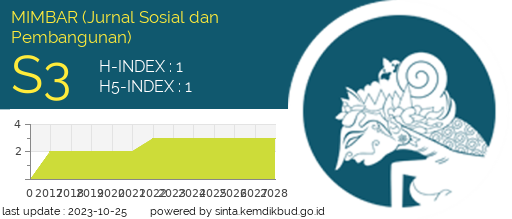Effective Leadership and Social Entrepreneurship Engagement in Optimal MSMEs Performance
DOI:
https://doi.org/10.29313/mimbar.v39i2.2076Keywords:
Leadership, Social Entrepreneurship, MSMEsAbstract
This study explores the synergistic relationship between effective leadership and social entrepreneurship engagement as key drivers for optimizing the performance of Micro, Small, and Medium Enterprises (MSMEs). As MSMEs play a pivotal role in fostering economic growth and societal well-being, understanding the nuanced dynamics that contribute to their success is paramount. The research delves into the multifaceted dimensions of effective leadership, encompassing transformative, servant, and inclusive leadership styles. It investigates how these leadership approaches influence organizational culture, employee motivation, and innovation within MSMEs. Moreover, the study examines the impact of social entrepreneurship engagement on MSMEs, emphasizing the integration of social and environmental responsibility into business practices. By employing a mixed-methods research design, including surveys, interviews, and case studies, the study aims to provide a comprehensive analysis of the interplay between leadership effectiveness, social entrepreneurship, and MSMEs performance. Preliminary findings suggest that organizations led by leaders who embrace adaptive and socially conscious strategies demonstrate increased resilience, employee satisfaction, and community engagement. The research contributes to both academic and practical perspectives by offering actionable insights for policymakers, business leaders, and entrepreneurs seeking to enhance MSMEs' contributions to sustainable development. The findings highlight the importance of cultivating leadership skills that prioritize ethical decision-making, stakeholder collaboration, and social impact.
References
Antonakis, J. (2017). The nature of leadership. Sage Publications, Inc.
Bass, B. M. (1985). Leadership: Good, better, best. Organizational dynamics, 13(3), 26-40.
Bagherzadeh, M., Markovic, S., Cheng, J., & Vanhaverbeke, W. (2019). How does outside-in open innovation influence innovation performance? Analyzing the mediating roles of knowledge sharing and innovation strategy. IEEE Transactions on Engineering Management, 67(3), 740-753.
Bennis, W., & Nanus, B. (1985). The strategies for taking charge. Leaders, New York: Harper. Row, 41.
Felix, C., Aparicio, S., & Urbano, D. (2018). Leadership as a driver of entrepreneurship: an international exploratory study. Journal of Small Business and Enterprise Development.
Fisk, R. P., Dean, A. M., Alkire, L., Joubert, A., Previte, J., Robertson, N., & Rosenbaum, M. S. (2018). Design for service inclusion: creating inclusive service systems by 2050. Journal of Service Management.
GS, A. D., & Istanti, E. (2022). Optimization of Micro-Small and Medium-Sized Enterprises in West Surabaya by Canvas Model. MIMBAR : Jurnal Sosial Dan Pembangunan, 10, 341–346. https://doi.org/10.29313/mimbar.v0i0.10039
Hamid, Z., Hengchao, Z., & Mhd-Sarif, S. (2017). Economic theories of social entrepreneurship. International Journal of Accounting, Finance, and Business (IJAFB), 2(6), 110-122.
Harrison, R. T., Leitch, C. M., & McAdam, M. (2018). Breaking glass: Towards a gendered analysis of entrepreneurial leadership. In Research handbook on entrepreneurship and leadership. Edward Elgar Publishing..
Haryono, S. (2017). Metode SEM untuk penelitian manajemen dengan AMOS LISREL PLS. Luxima Metro Media, 450.
Islam, A., Zawawi, N. F. M., & Abd Wahab, S. (2021). Rethinking survival, renewal, and growth strategies of SMEs in Bangladesh: the role of spiritual leadership in a crisis situation. PSU Research Review.
Kannampuzha, M., & Hockerts, K. (2019). Organizational social entrepreneurship: scale development and validation. Social enterprise journal.
Lortie, J., & Cox, K. C. (2018). On the boundaries of social entrepreneurship: A review of relationships with related research domains. International Entrepreneurship and Management Journal, 14(3), 639-648.
Madanchian, M., & Taherdoost, H. (2019). Assessment of leadership effectiveness dimensions in small & medium enterprises (SMEs). Procedia Manufacturing, 32, 1035-1042.
Maria, A., Valentina, D. P., Raffaele, I., Salvatore, M., & Stefano, R. (2020). Assessment and implementation of industry 4.0 paradigm: research topics and trends. In Proceedings of the Summer School Francesco Turco (pp. 1-7). AIDI-Italian Association of Industrial Operations Professors.
Mon, A., & Del Giorgio, H. R. (2022). Analysis of Industry 4.0 Products in Small and Medium Enterprises. Procedia Computer Science, 200, 914-923.
Phillips, W., Lee, H., Ghobadian, A., O’regan, N., & James, P. (2015). Social innovation and social entrepreneurship: A systematic review. Group & Organization Management, 40(3), 428-461.
Samuelsson, P., & Witell, L. (2022). Social entrepreneurs in service: motivations and types. Journal of Services Marketing, (ahead-of-print).
Susbiyani, A., Nastiti, A. S., & Animah, A. (2021). SMEs’ Strategies for Improving Financial Performance Through Competitive Advantages. MIMBAR : Jurnal Sosial Dan Pembangunan, 37(2), 430–441. https://doi.org/10.29313/mimbar.v37i2.7997
Thahira, A., Tjahjono, H. K., & Susanto, S. (2020). The Influence of Transactional Leadership on Organization Innovativeness (OI) Mediated by Organizational Learning Capability (OLC) in Medium Small Enterprise Kendari City. Jurnal Manajemen Bisnis, 11(1). https://doi.org/10.18196/mb.11190Wanyoike, C. N., & Maseno, M. (2021). Exploring the motivation of social entrepreneurs in creating successful social enterprises in East Africa. New England Journal of Entrepreneurship.
Werang, B. R. (2015). Pendekatan Kuantitatif dalam Penelitian Sosial. Yogyakarta: Calpulis.
Wenzel, M., Stanske, S., & Lieberman, M. B. (2020). Strategic responses to the crisis. Strategic Management Journal, 41(7/18).
Yukl, G. (1999). An evaluation of conceptual weaknesses in transformational and charismatic leadership theories. The leadership quarterly, 10(2), 285-305.
Znagui, Z., & Rahmouni, B. (2019). What ecosystem model to support the creation of social innovation technopoles?. Procedia Computer Science, 158, 877-884.
Downloads
Published
Issue
Section
License
Copyright (c) 2023 MIMBAR : Jurnal Sosial dan Pembangunan

This work is licensed under a Creative Commons Attribution-NonCommercial-ShareAlike 4.0 International License.














